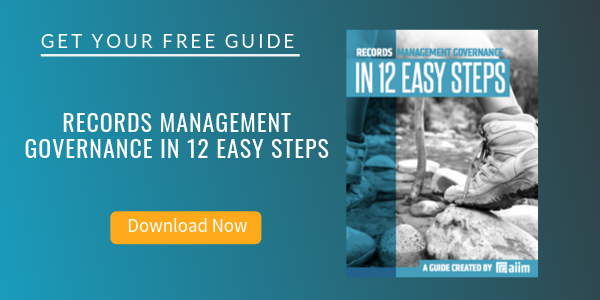
8 Reasons Why Information Governance Makes Sense
In a recent study on information governance, the Economist Intelligence Unit found that the single biggest worldwide challenge to successful adoption of information governance is the difficulty of identifying its benefits and costs. In other words, the difficulty of making the case for proper governance. Learning to articulate the case can be the difference between success and failure with information management. Here are 8 reasons why information governance makes sense:
-
We Can’t Keep Everything Forever
Information governance makes sense because it enables organizations to get rid of unnecessary information in a defensible manner. Organizations need a sensible way to dispose of information in order to reduce the cost and complexity of their IT environment. Having unnecessary information around only makes it more difficult and expensive to harness the information that has value.
-
We Can’t Throw Everything Away
Information governance makes sense because organizations can’t keep everything forever, nor can they throw everything away. We need information – the right information, in the right place, at the right time. Only information governance provides the framework to make good decisions about what information to keep.
-
E-Discovery
Information governance makes sense because it reduces the cost and pain of discovery. Proactively managing information reduces the volume of information exposed to e-discovery and simplifies the task of finding and producing responsive information.
-
Your Employees are Screaming for It – Just Listen
Information governance makes sense because it helps knowledge workers separate “signal” from “noise” in their information flows. By helping organizations focus on the most valuable information, governance improves information delivery and productivity.
-
It Ain’t Gonna Get Any Easier
Information governance makes sense because it's a proven way for organizations to respond to new laws and technologies that create new requirements and challenges. The challenges brought on my poor governance will not get easier over time, so organizations should get started now.
-
The Courts Will Come Looking for Information Governance
Information governance makes sense because courts and regulators will closely examine your governance program. Falling short can lead to fines, sanctions, loss of cases, and other outcomes that have negative business and financial consequences.
-
Manage Risk: Information Governance Is a Big One
Organizations need to do a better job of identifying and managing risk. The risk of information management failures is a critical risk that information governance helps to mitigate.
-
Email: Reason Enough
Information governance makes sense because it helps organizations take control of email. Solving email should be a top priority for every organization.
About John Mancini
John Mancini is the President of Content Results, LLC and the Past President of AIIM. He is a well-known author, speaker, and advisor on information management, digital transformation and intelligent automation. John is a frequent keynote speaker and author of more than 30 eBooks on a variety of topics. He can be found on Twitter, LinkedIn and Facebook as jmancini77. Recent keynote topics include: The Stairway to Digital Transformation Navigating Disruptive Waters — 4 Things You Need to Know to Build Your Digital Transformation Strategy Getting Ahead of the Digital Transformation Curve Viewing Information Management Through a New Lens Digital Disruption: 6 Strategies to Avoid Being “Blockbustered” Specialties: Keynote speaker and writer on AI, RPA, intelligent Information Management, Intelligent Automation and Digital Transformation. Consensus-building with Boards to create strategic focus, action, and accountability. Extensive public speaking and public relations work Conversant and experienced in major technology issues and trends. Expert on inbound and content marketing, particularly in an association environment and on the Hubspot platform. John is a Phi Beta Kappa graduate of the College of William and Mary, and holds an M.A. in Public Policy from the Woodrow Wilson School at Princeton University.



